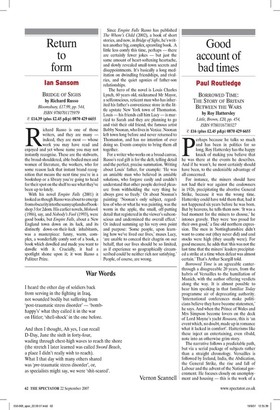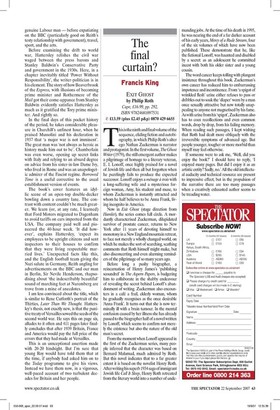Good account of bad times
Paul Routledge BORROWED TIME: THE STORY OF BRITAIN BETWEEN THE WARS by Roy Hattersley Little, Brown, £20, pp. 454, ISBN 9780316730327 £16 (plus £2.45 p&p) 0870 429 6655 perhaps because he talks so much and has been in politics for so long, Roy Hattersley has the happy knack of making you believe that he was there at the events he describes. And if he wasn't, he most certainly should have been, to the undeniable advantage of all concerned.
For instance, the miners should have not had their war against the coalowners in 1926, precipitating the abortive General Strike, because it was the wrong time. Hattersley could have told them that, had it not happened six years before he was born. But by heavens, he tells them now. 'It was a bad moment for the miners to choose,' he intones gravely. They were 'too proud for their own good,' a fine old northern expression. The men in Nottinghamshire didn't want to come out (they never did) and coal stocks were high (they usually were). For good measure, he adds that 'this was not the last time that the miners' leaders precipitated a strike at a time when defeat was almost certain.' That's Arthur Scargill told.
Borrowed Time is an agreeable canterthrough a disagreeable 20 years, from the hubris of Versailles to the humiliation of Munich, with the author offering verdicts along the way. It is almost possible to hear him speaking in that familiar Today programme air of deprecating authority. 'International conferences make politicians believe they have become statesmen,' he says. And when the Prince of Wales and Mrs Simpson become lovers on the deck of Lord Moyne's yacht Rosaura, this is 'an event which, no doubt, made up in romance what it lacked in comfort'. Hatterisms like these inject an entertaining, even ribald, note into an otherwise grim story.
The narrative follows a predictable path, but via a serial package of subjects rather than a straight chronology. Versailles is followed by Ireland, India, the Abdication, the General Strike, the rise and fall of Labour and the advent of the National government. He focuses closely on unemployment and housing — this is the work of a genuine Labour man — before expatiating on the BBC (particularly good on Reith's testy relationship with government), travel, sport, and the arts.
Before examining the drift to world war, Hattersley relishes the civil war waged between the press barons and Stanley Baldwin's Conservative Party and government in the 1930s. Here, in a chapter inevitably titled 'Power Without Responsibility', the writer-politician is in his element. The story of how Beaverbrook of the Express, with illusions of becoming prime minister and Rothermere of the Mail got their come-uppance from Stanley Baldwin evidently satisfies Hattersley as much as it gratified the Tory prime minister. And rightly so.
In the final days of this pocket history of the period, he takes considerable pleasure in Churchill's unfinest hour, when he praised Mussolini and his declaration in 1937 that 'a major war is not imminent'. The great man was 'not always as heroic as history made him out to be'. Chamberlain was even worse, opening up secret links with Italy and relying to an absurd degree on advice from his sister-in-law Dame Ivy, who lived in Rome and was an unapologetic admirer of the Fascist regime. Borrowed Time is a useful corrective to the usual establishment version of events.
The book's cover features an idyllic scene of an open-top double-decker bowling down a country lane. The contrast with content couldn't be much greater. We learn (or, at any rate, I learned) that Ford Motors migrated to Dagenham to avoid tariffs on cars imported from the USA. The company paid well and pioneered the 40-hour week. 'It did however', explains Hattersley, 'expect its employees to be upright citizens and sent inspectors to their houses to confirm that they were living respectable married lives.' Unexpected facts like this, and the English football team giving the Nazi salute in Germany, Reith angling for advertisements on the BBC and our man in Berlin, Sir Nevile Henderson, rhapsodising about `the indescribably beautiful' sound of marching feet at Nuremberg are trove from a mine of anecdotes.
I am less convinced about the title, which is similar to Rene Cutforth's portrait of the Thirties, Later Than We Thought. Hattersley's thesis, not exactly new, is that the punitive treaty of Versailles sowed the seeds of the second world war. He says this on page six, alludes to it often and 411 pages later finally concludes that after 1939 Britain, France and America would pay the full price of the errors that they had made at Versailles.
This is an unxceptional assertion made with 20-20 hindsight. But I'm sure that young Roy would have told them that at the time, if anybody had asked him on to the Today programme to give his views. Instead we have them now, in a vigorous, well-paced account of two turbulent decades for Britain and her people.


































































 Previous page
Previous page